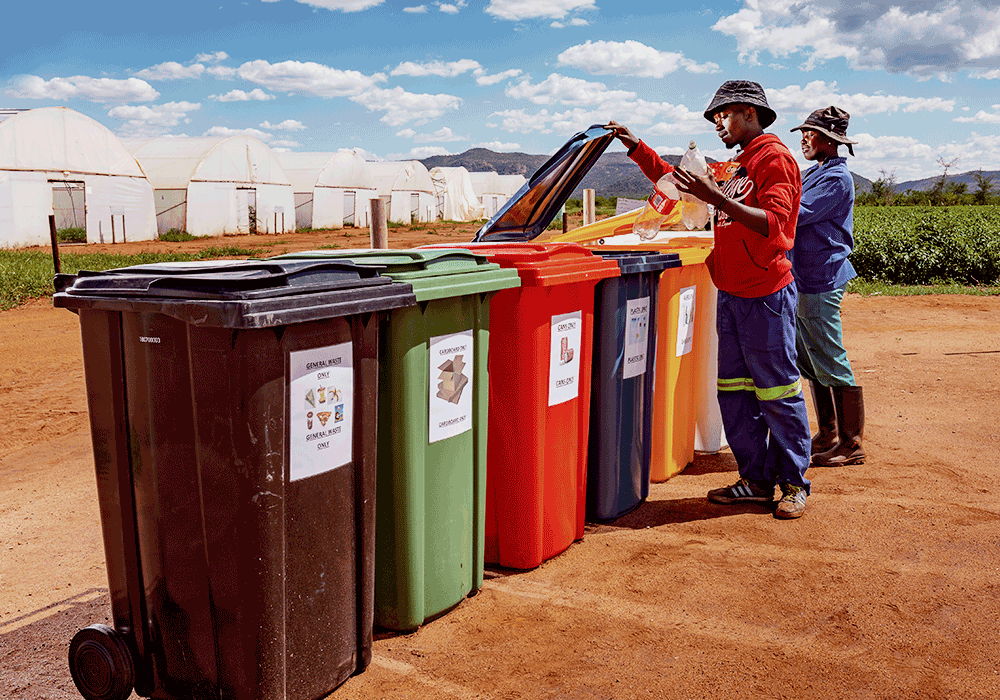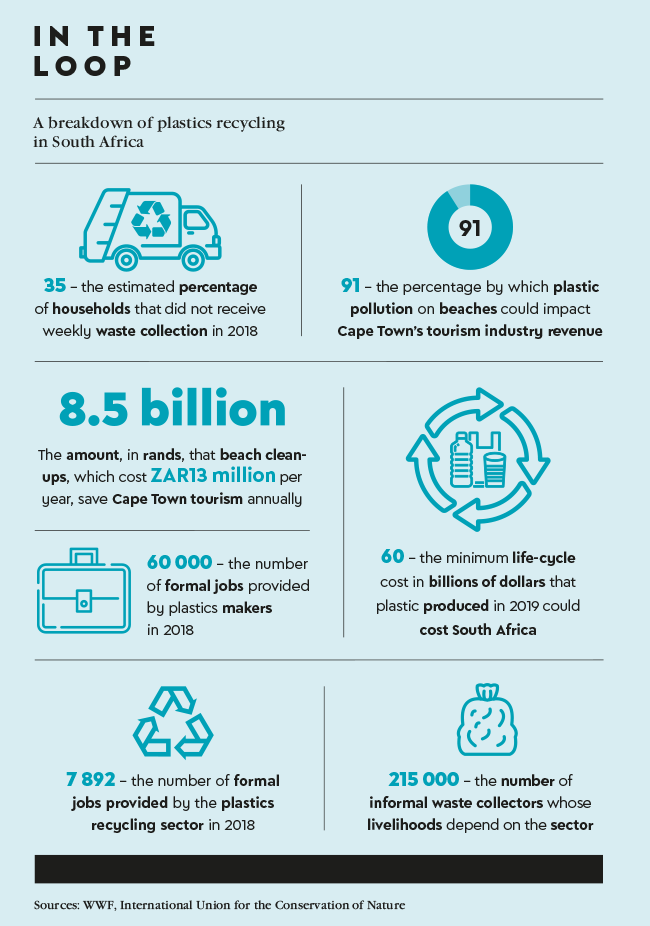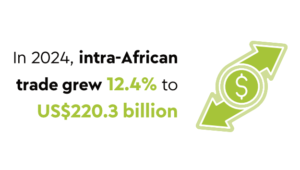It’s no secret that South Africa is one of the worlds’ biggest contributors to plastic pollution. In global rankings, the country is the 11th-worst global offender of leaking land-based plastic into the ocean, according to a report released in September 2021 by the WWF. South Africa generates 41 kg of plastic waste per person annually, which is significantly higher than the global average of 29 kg. The report suggests a weak and overwhelmed waste-management system is to blame. ‘In 2018, 35% of households did not receive weekly waste collection and 29% of household waste was not collected. As a result, plastic leakage is high, with an estimated 79 000 tons of plastic leaking into the environment per year.’
This pollution isn’t only harming the environment – there is a high financial price too in the form of damage to livelihoods and key economic industries, imposition of clean-up costs on governments and threats to the population’s health. A study conducted in Cape Town found that plastic pollution on beaches has a major impact on the tourism sector, potentially reducing tourism revenue and employment by up to 91%. The City of Cape Town spends ZAR13 million on regular beach clean-ups per year, and through this avoids damage of an estimated ZAR8.5 billion to the local tourism sector.
More broadly, the WWF puts the minimum life-cycle cost that was imposed on South Africa by the plastic produced in 2019 at about US$60.72 billion. The solution, however, is anything but simple.
According to industry umbrella body Plastics SA, South Africa’s plastics industry is dominated by the packaging sector (which accounts for roughly 52% of the local market), followed by building and construction (13%), agriculture (9%), and automotive and transport applications (7%).
The plastics and plastics-recycling industries provide employment to a significant portion of the population – 60 000 jobs were provided by plastics manufacturers in 2018, a number that ‘can be attributed to the maturity of the plastics value chain in South Africa’, says the WWF; and 7 892 formal jobs are provided in the plastics-recycling sector. Then there are informal waste collectors – aka waste pickers or reclaimers – which some estimates place at 215 000, and which account for many more self-created livelihoods in the waste sector.
Clearly, decisive action is needed to stem plastic leakage into oceans – action that takes into account the environment as well as the significant contribution that plastics make towards the economy, job creation, industry and our daily lives. For this reason, the most credible solutions to the plastics crisis involves ways to transition to a circular plastics economy, a regenerative ‘closed loop’ that keeps the value of plastics within the economy, but without leakage into the environment, and which takes into account those who rely on plastic, in some way or another, for their livelihood.
In early March this year, a historic draft resolution was reached at the resumed fifth session of the UN Environment Assembly, when heads of state, ministers of environment and other representatives from 175 nations met in Kenya, Nairobi, to establish an internationally legally binding agreement by 2024 that will bring an end to plastic pollution.
The resolution, titled End Plastic Pollution: Towards an Internationally Legally Binding Instrument, has been called for with increasing urgency in recent years, and was described as ‘a landmark agreement that is the most important international multilateral environmental deal since the Paris climate accord’ by Inger Andersen, executive director of the UN Environment Programme.
South Africa’s Cabinet supported the draft treaty ahead of the negotiations, and Plastics SA executive director Anton Hanekom says the resolution makes it clear that business has an important role in ending plastic waste. ‘Governments are interested in learning about what business is doing to end plastic waste. The resolution appeals to the business community to develop new commitments that will increase the ambition of the global agreement,’ he said. ‘It also highlights the need for enhanced international collaboration to facilitate access to technology, capacity building and scientific and technical co-operation in order to improve the collection and recycling of plastic waste.’
So, what is business doing? The most significant collective step corporate South Africa has taken towards reducing plastic waste is the founding of the SA Plastics Pact in January 2020, which binds members to an ambitious commitment to create a circular economy for plastics by 2025.
The pact was founded by heavyweights Clicks Group, Danone, Distell, HomeChoice, Massmart, Myplas, Nampak Rigids, Pick n Pay, Polyoak, Polyplank, Shoprite Group, Spar, Spur Corporation, Foschini Group, Tigerbrands, Tuffy, Unilever, Addis, Waste Plan and Woolworths, which have been joined by Coca-Cola Beverages South Africa, UPM Raflatac, CCL Label South Africa, the Sustainable Seas Trust, Fruit South Africa, the South African Plastics Recycling Organisation (SAPRO), the Polyolefin Responsibility Organisation, the Polystyrene Association of South Africa, the PET Recycling Company, the Southern African Vinyls Association, the Institute of Waste Management of Southern Africa, and the national Department of Forestry, Fisheries and the Environment, as well as the City of Cape Town.
The pact commits members to four targets, namely to take action on problematic or unnecessary plastic packaging through elimination, redesign, innovation or alternative (reuse) delivery models; that 100% of plastic packaging be reusable, recyclable or compostable by 2025; that 70% of plastic packaging is effectively recycled; and to ensure an average of 30% of recycled content across all plastic packaging.
The path to reaching these targets is outlined in a strategic roadmap managed and delivered by GreenCape, an NPO aimed at facilitating the adoption of economically viable green-economy solutions.
‘The pact is part of the Ellen MacArthur Foundation’s global Plastics Pact network, which consists of 10 national pacts and two regional pacts,’ says GreenCape circular economy analyst Deshanya Naidoo. ‘We also work closely with WRAP [the Waste and Resources Action Programme], based in the UK, which actively supports Plastics Pact implementation in a number of countries including South Africa, Kenya, Chile and India, as well as partnering with the WEF’s Global Plastics Action programme. The SA Plastics Pact meets regularly with the Kenya Plastics Pact, a Senegal initiative on plastics, and the Ghana National Plastics Action programme under the WEF, as well as additional meetings with the global Pact network, in which learnings are shared and collaborative projects explored.’
Sounds impressive – but how accountable are member companies to the pact, and how is their progress being measured?

‘Members are required to report on their plastic-packaging portfolio to the SA Plastics Pact on an annual basis,’ says Naidoo. ‘Last year was the first reporting year, resulting in the publication of our baseline report. We have a fixed and comprehensive template to collect data that is then analysed under KPIs for each target. We reviewed our progress against the 2025 roadmap following the publication of our baseline report in 2021. Outcomes and activities under Targets 2 and 4 were identified as needing focus, with further work required on guiding members in design for circularity and including recycled content in their packaging, which will not only drive progress towards Target 4, but also drive recycling rates, Target 3, by increasing demand.’
GreenCape works with members to identify problematic areas, such as packaging. Under the advisement of GreenCape, Pick n Pay will now be the first retailer to phase out barrier bags – those flimsy, translucent packets provided at checkout – and is in the process of removing them. The retailer has already made great strides in reducing its plastic waste, from using recycled plastic bottles to creating cheap reusable shopper bags, removing plastic straws, reducing the weight of plastic packaging across many of its ranges, and introducing reusable netted bags for fresh produce, resulting in a reduction of more than 100 tons of plastic waste annually.
‘The netted bags are designed to be reused continuously, but if customers reused theirs only 10 times, it would lead to a reduction of more than 2 million plastic fruit and veg bags,’ says GM of sustainability at Pick n Pay, Andre Nel. ‘This is part of Pick n Pay’s work to shift customers towards a “reuse” mindset and reduce the amount of fresh produce bags used at stores. Pick n Pay has made good progress towards their packaging targets, but there is still a lot of work to do to achieve the ambitious goals as set out by the South African Plastics Pact.’ Pick n Pay has also been improving its packaging database and reporting processes, says Nel, which helps teams to track performance against their packaging targets and assists in identifying areas where packaging can be minimised, eliminated or reduced.
Operation Clean Sweep, an international stewardship programme designed to help keep plastic pellets, flakes and powders out of the marine environment, has been joined by a number of South African plastics industry representative bodies, including the Southern African Plastic Pipe Manufactures Association, MyPlas, Safripol and SAPRO, which represents 42 of South Africa’s major plastics recyclers. In September 2020, Sasol became the first raw-material supplier to the South African plastics industry to become a signatory. Plastics SA is the licensee and project co-ordinator for Operation Clean Sweep in South Africa, providing a toolkit of interventions for signatories to minimise or prevent leakages.
These are just a few of South Africa’s voluntary plastic waste-reduction programmes for businesses. It remains to be seen whether the ambitious targets will be met, but it’s clear that corporate South Africa is not resting on its laurels when it comes to stemming the tide of plastic waste entering our oceans.

















